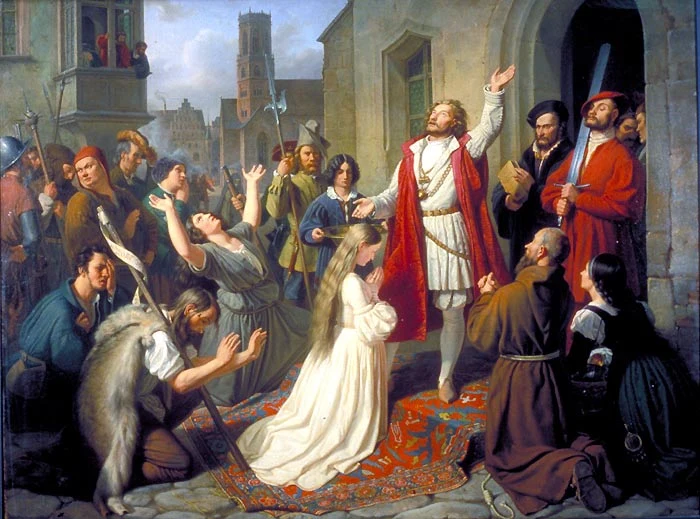Wowie, it's that time again! Another loooongpost about Anabaptists and the siege of Munster! This time, we're getting to the actual siege part! Last time LINK we touched briefly on what Anabaptism itself is, then how it came to dominate Munster, and the powers-that-be's response to that takeover (they weren't happy). Now, we're going to see how their campaign on the Anabaptists played out and what those scampy little sectarians get up to in the meantime 
=========
A NEW ZION
=========
With Jan Matthias dead Van Leyden jockeyed to replace him. If you remember from last time, van Leyden had a bit of a hysterical freak-out (trust him it was, like, totally real guys) and said that he was about to receive a vision from God telling them what to do about the vacuum left after Mattias' head's departure from his body.
Turns out, the government wasn't up to snuff for the big man upstairs. Nominally, things were still run by the old elected council and its co-mayors, a government that better reflected the bygone heathen times than the holy new order. And what better way to ensure the government is sufficiently holy than mimicking that of old Israel? 


The council was abolished, replaced by an appointed assembly of 12 elders, but as more of a rubber stamp than a true legislature. Knipperdolling received the office of Schwertfuhrer (literally sword-leader), tasked with the enforcement of the new government's rule. Rothmann remained officially untitled, but kept his position as something of a propaganda minister.
""""The elders"""" issued a new law code, creating offenses for things such as "idle conversation" and "disobeying the elders."
Various informal procedures were stadardized. Food and resource management were reformed and certain behaviors were restricted and enforced to align with Anabaptists sensibilities. The doors to homes were required to be left open, clothes could neither be too fine nor too ragged, meals were to be held in common, any misbehavior was to be reported to the authorities, etc.
Individual autonomy was sacrificed to God and the shared goal of the Anabaptist movement. Designed to be unreasonably restrictive, the Laws' intent was not to make a set of standards by which to govern society, but to subject Munster to the arbitrary will of those in power. The new government accomplished with threats and violence what Matthias once had with words.
Some people might say that the new measures fly in the face of the very basis of Anabaptism, the doctrine of free choice. Some people also ended up on the wrong end of the executioner's block.
=================
RIDER ON A RED HORSE
=================
While the Anabaptists built their government's new rotten structure, Bishop Franz plotted to kick the door in. He hoped for a quick assault, to use his overwhelming forces and put an end to the madness in his city. A fast resolution was practically needed, as he was hemorrhaging money.
Mercenary armies are expensive, and he'd bit off a bit more off than he could chew. He'd already put himself in a mountain of debt to just hire the army, speaking nothing of the cost of upkeep. His mercenaries could tell, too; they failed to receive regular pay and supplies, and some took this as a signal to jump boat, either deserting or moving over to the Anabaptists. Loyalest mercs and most fiscally responsible nobleman.
The plan was simple enough: bring in peasants for the hard labor of filling in the moats, use artillery to blast a hole in the walls, and send the soldiers to kill and hopefully not get killed at sunrise, May 25th. Oh, what is it they say about mice and men? Don't be r-slurred or you'll get shot? Something like that.
Anyway, the soldiers got drunk the night before and began the assault at sunset, not sunrise. Drunken and disorganized, the mercenaries were slaughtered. The failed assault greatly shook the morale of the Bishop's men, who Franz now suspected of disloyalty.
The defeat in late May made worse the humiliations the Bishop already suffered. Aside from the daily jeering coming from the garrison at the walls, the Anabaptists had before staged a couple incidents aimed at the ego of both Franz and the mercenaries.
They'd once built a chariot of wine barrels pulled by two horses, and sent it out a gate to the besieging army, among whom wine was scarce. The manure that poured from the barrels into the army's trenches upon destruction of the cart was unlikely to slake the soldiers' thirst. Another time, the defenders of the city sent out a dummy dressed in mock-up Bishop's wear. riding a horse. The mercenaries chased the dummy down, thinking it was one of the enemy, while a crowd laughed at them from a city gate.
Some say war's Heck, but maybe it's just what you make of it 
===============
THE SECOND CIRCLE
===============
Jan van Leyden had actually been married thrice now. Once to his wife back in the Netherlands (who he abandoned along with two children), again to a daughter of Knipperdolling (who abandoned Munster and van Leyden sometime earlier), and finally to Divara, widow of Jan Matthias. It may have been his personal inability to keep it in his pants, then, that motivated the government to not only allow multiple marriages for men, but to legally require them.
Pointing to the Biblical command of "go forth and multiply" and examples set by various Old Testament patriarchs, every woman in the city was mandated to take a husband, and every man, a wife. Being that women substantially outnumbered men as residents of Munster, polygamy naturally followed. Men without multiple or few wives were branded impious and women who refused to take husbands were executed. An incel's dream. 
This was going liiiittle too far. Even Rothmann, the ever-loyal propagandist, was reportedly less than enthused when delivering his daily sermons (though that didn't stop him from taking additional wives). Rumors of licentiousness floated around the Anabaptist leaders, particularly van Leyden. It didn't help that "all women" apparently included prepubescent girls. Snappy, how do strags reproduce?
Some measures were walked back, but it was too little too late. Van Leyden had underestimated the loyalty, or subservience, of Munster's population. On July 30th, many of the discontented, lead by Henry Mollenheck, the local blacksmith, allied themselves with the deserter mercenaries living in the city and took the Anabaptist leadership hostage in the city hall's jail. Van Leyden, Knipperdolling, and Rothmann were all captured.
For all his bold action, Mollenheck was hardly a sound strategist. The mutineers had no idea of what to do beyond the capture of the leaders, and sat around doing nothing while Herman Tilbeck, former mayor and then elder, rallied some of the garrison. A short siege-within-a-siege occurred at the city hall, ending after Mollenheck's forces were pushed to the second floor and the leader of the mercenaries was killed. None of the Anabaptist leaders were injured.
Around 120 men had joined in the mutiny, and it was unrealistic to execute them all, despite the wants of Anabaptist leadership. In his capacity as Schwertfuhrer, it was up to Knipperdolling to administer justice. Of the 49 executed, a plurality were beheaded. Some were cut in half at the waist. Others were tied to gravestones or trees and shot after having their arms removed. One man was sliced down the middle while begging for a chance to say goodbye to his wife and children. This was the last episode of true resistance within the city.
You might feel bad for them. The rebel's cause seemed just enough, but their short sightedness was astounding. I'm not exaggerating, either. All they did was capture the leaders and then nothing else 
=======
BETHULIA
=======
So Franz's first assault was a failure, sure, but he still had the upper hand! He had more men, more resources, and certainly more fire power. Philip of Hesse had gifted him "The Devil" and "The Devil's Mother," two massive artillery pieces whose deafening blasts echoed throughout every encampment encircling Munster. These cannons alone made for excellent siege weaponry.
They were to be used in a second assault, their fire concentrated on the city's main gate, destroying it and clearing an opening to funnel soldiers through. The moat surrounding the city had been filled in once again. You can't expect an army to carry out an effective attack when wading through muddy water. The Bishop even made sure his soldiers hadn't drank the day before. That's how you can tell this plan was truly genius: by the fact that it's exactly the same as the old one, minus alcohol.
The artillery opened fire on the 28th of August, and van Leyden deserves some credit for his reaction to the opening volleys. The entire day, he rode back and forth across Munster's lines, commanding his garrison while cannon balls, arrows, and bullets whizzed past him. The Anabaptists managed to respond with enough fire power to ward off assault from the Bishop's army after the outer wall had been destroyed, the day passing without any direct combat.
The second day of action came on the 31st. Heavy rain had deterred the men from any operation in the intermediary period, and undone all the hard work the Bishop's peasant labor conscripts performed filling the moat. Still determined to carry on the assault, the Bishop had his men supplied with makeshift straw rafts with which to wade across the water. Blasting through the equally makeshift repairs the Anabaptists patched the walls with, the mercenaries actually made it past the first set of them this time. Climbing up the tattered inner walls with ladders, the soldiers initiated combat on the last line of defense before the city proper.
These mercenaries were veterans, experienced in the many wars ravaging Europe post-reformation. They'd fought in France, Spain, Italy, even their very home country of Germany, while the Anabaptists' was limited to what action they'd seen earlier in the siege. The Anabaptists were believers, zealous, but not soldiers, so the fighting was a slaughter... for the mercenaries.
Turns out no amount of experience in soldiery can make up for the fact that they had to climb ladders while being shot with bullets and arrows, wreaths of fire snagging on them, tossed from the edge above, boiling oil and quicklime coating their bodies from cauldrons prepared up high. Those who escaped death on the wall were sitting ducks at it's base, makeshift straw rafts providing inadequate transport for a retreating force now panicking. The Anabaptists suffered 15 losses to the mercenaries' hundreds, including 42 officers. Womp Womp 
Franz von Waldeck was surely furious again, but his rage was impotent. He was broke and humiliated, without results and devoid of the wealth required to maintain his army of mercenaries. But he wasn't alone in his fight. Several neighboring princes of Germany had taken interest in the conflict, including Emperor Charles V himself, recognizing the potentially existential danger it posed to the social order.
Despite his recent failings, the Bishop could still rely on practically guaranteed support from his peers. With time on his side, rather than risk yet more men in further assaults, the Bishop dug his army in around the city, tightening the blockade. He was preparing for a prolonged siege, one that would be won by cutting off Munster's defenders from necessary supplies. The Bishop then retired to a palace in Iburg, one of his lands, to wait out the Anabaptists. In his absence, Count Wirich von Dhaun-Falkenstein was left in charge of the day-to-day operations of the army.
============
DAVID'S CROWN
============
The failure of both the Bishop's assault and Mollenheck's rebellion emboldened the Anabaptists. Gone were the days of unrest and opposition experienced after Matthias' death and the institution of polygamy. Before this backdrop of renewed assurance in their cause, Johann Drusentschur, a resident goldsmith, found himself whipping up crowds in the plazas and streets of Munster. You see, he had a vision! A HOLY VISION! Sent from GOD no less! With the sheer volume of prophets receiving visions lately you'd wonder what Munsterite lacked the ability to commune with the divine.
He drew crowds nonetheless. And what he had to say was as astounding as it was predictable. Jan van Leyden, of course, was no ordinary divinely appointed messenger. No; he was greater than that, better than that, far more important than that. Van Leyden wasn't meant to preach. He wasn't meant to prophesy. He wasn't some over glorified mailman in Heaven's postal service! He was meant to LEAD! Drusentschur placed a crown atop van Leyden's head, gave him a scepter and a sword, and offered him the throne of David, King of Israel. Only the throne was metaphorical.
Van Leyden accepted his new duty. Far be it from him to refuse God's command. But, believe him, he wanted to. He made a big show of it—his confession. How unworthy he was of such a high office, to be supreme executive of God's Holy Kingdom on Earth, destined to rule the world as patron of the faithful. It was only his humility, his loyalty to God, that forced him to accept, prostrate before Drusentschur and the crowd gathered at Cathedral square.
It's this moment that some historians say the Anabaptist movement became as farcical as it had once been revolutionary. Drusentschur was more van Layden's toadie than God's messenger. Others praise van Leyden for his irony. In accepting kingship, he was making a mockery of the very feudal system Munster was rebelling against. No modern source portrays the coronation as genuine.
===========
ADAM DELVED
===========
King Jan wasn't satisfied with the title alone. He's king, and he wanted all the trappings that came with that job. Or God did, sure, whatever... It was God who wanted the ruler of His kingdom to be dressed in the finest clothes available, draped in golden jewelry, accompanied by royal guardsmen, and living in a palace. He wanted all of that. 
Luckily, he had most of that available. Van Leyden designed a crest, two blades piecing a globe, and attached the symbol to the uniforms of public officials. For himself, van Leyden ordered a red silken robe tailored. He wore necklaces and rings, one for each finger, forged alongside a golden throne, to be placed in Cathedral Square. Two young men were stationed at either side of the throne, one holding a sword and the other the Old Testament. The king held daily assemblies there, passing judgement onto those accused of violating the law.
The mansion of the Bishop's representative in Munster, who had long since fled, was seized. Converted into a palace, van Leyden staffed the residence appropriately. Servers, chefs, butlers, attendants, all were appointed. The palace staff numbered over 100 people when fully assembled. Divara, his queen and first wife, was given her own residence, complementary staff included.
No king was complete without his court and van Leyden was no exception. Knipperdolling was made chief minister, effectively second in command, as he had always been. Rothmann's position as Anabaptist spokesman was finally formalized. A new schwertfuhrer was appointed, along with a marshal, Herman Tilbeck. The Kretching brothers, two minor noblemen who had joined the Anabaptist cause, were both given high positions. Bernard Kretching managed the commanders of the garrison, while his brother, Henry Kretching, was named chancellor. A royal guard was formed, given steeds and priority rations. Christoph von Waldeck, bastard son of the Bishop, counted among their number.
Van Leyden was living it up! Aren't you jealous? You should be, because he kept all this prosperity to himself and his staff. The commoners were all made to swear a vow of poverty while van Leyden and his friends lived their best. And the opening sentences weren't just me being facetious, either. The official line from the government was that King Jan HAD to live in luxury, as anything less wouldn't be properly honoring God. Van Leyden himself claimed to derive no joy from Earthy pleasures. Nevermind how a man can be content in asceticism, but not God.
================
BREAD AND CIRCUSES
================
The siege dragged on while van Leyden played royal. The months had seen no serious action after the blockade of the city was tightened, but that wasn't necessarily a good thing for the Anabaptists. They had the defensive advantage, they had the resources and will to fight, but the didn't have time.
Hunger hadn't yet set in, but food stores were slowly depleting and what little was produced within the walls wasn't nearly enough to feed the populace alone. Van Leyden had talked of a sally, the priests had preached of reinforcements, but days turned into nights, deadlines passed, no help materialized, and no offensive action was ordered. Anxieties rose once again within Munster and the new king needed to find ways to assuage them.
A number of public feasts and games were held, but the feasts no longer featured full meals, as they once had. Wine, bread, and meats were served at public banquets meant to satisfy the people's hunger. For the average Anabaptist, not starving, yet still anxious over when the next meal would come, enjoying a meal surrounded by neighbors and friends may have been enough to forget about those worries for a time.
Of the games, the joust was a favorite of van Leyden, who competed while riding a white horse he'd taken possession of upon being declared king. Clearly being the superior athlete, van Leyden always won the games he participated in. 
Van Leyden was lucky to have his theater experience, especially at a time like this. He had not only been an actor back in the Netherlands, but a minor playwright as well. Acted out in St. Lambert's Cathedral, one play featured a mock Catholic mass. Severed animal limbs were thrown on stage as "religious offerings." Actors dressed as monks sang Catholic hymns, their lyrics rewritten to be vulgar parodies of the originals, and punctuated by the monks lifting their robes, revealing their bare asses, and farting on que. At the end, Rothmann took take stage, declaring the show just as holy as any real mass.
For all the entertainment van Leyden organized, the people still needed some proof of action. Good words could only reassure them for so long. For that reason, or maybe because van Leyden feared his growing influence, Drusentschur had another vision.
At one of the public feasts, the Goldsmith suddenly stood on the table, announcing his vision to the king and his subjects. Though future days looked increasingly grim, God had not abandoned them. He was going to deliver them from hardship, but first required His word to reach the far corners of the world. For this task, 27 Apostles had been revealed. Drusentschur presented a list of names to King Jan of those who had been chosen for this holy task. The resident schoolmaster Henry Graes and Drusentschur himself were of those names listed.
Upon the departure of the apostles and their wives (all 134 of them), the citizens of Munster could only hope and speculate on the status of their mission. With the blockade tightened, scant few details reached Munster from the world outside. Rumors abounded of the mission's spectacular results. A great army had been raised to March on Rome, seat of the false Pontiff. In the Netherlands, thousands of true believers were gathering to rescue the besieged Munster. In England Henry VIII had broke with Rome been rebaptized as a Brother in the Company of Christ. 


But are any of these true? Guess you'll just have to wait to find out... 


Yeah, this is gonna be a three-parter. Woooowwww I don't know how that Boer does it. 
I didn't explain it in depth since I couldn't figure out how to fit it in and keep the semblance of flow I'm looking too, but van Leyden marrying Divara is actually a big deal. It sets him up as a sort of successor to Matthias and lends him legitimacy in an era mostly politically dominated by familial relations.
And I don't know if you caught the contradiction, but Matthias' vision before his death was that he'd kill the Bishop's army completely alone, yet he took a group of soldiers out with him. That was the excuse van Leyden gave for why it didn't work out and how it was actually a good thing that Matthias was dead. Next one will probably be about Munster's fall. Ooohhhh spoilers. Wouldn't want to give away how this 500 year old event ends cuz I just know your biting your fingers to the bone to know whether or not God's kingdom conquered the world.
Blood streaming down from your wrist's exposed innards, bones pearly white from how thoroughly you've spit cleaned them, gnashing away all that there is of your hand flesh. You... you frickin' disgust me



 Blundering Bishops and Crowed Commoners
Blundering Bishops and Crowed Commoners  [Commie Waco Pt.2]
[Commie Waco Pt.2]









Jump in the discussion.
No email address required.
Once again this is a great effort post. Actually engaging.
I know people IRL who'd like that implemented.
I knew a family at school who removed the interior doors and mirrors in the house becuse you don't need privacy unless you're sinning and mirrors make people vain.
Jump in the discussion.
No email address required.
More options
Context